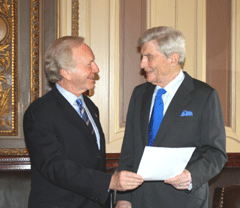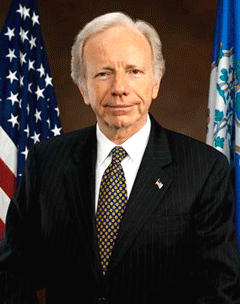Climate in the Congress
Air Date: Week of October 26, 2007

Senators Lieberman and Warner reviewing the America's Climate Security Act. (Courtesy of the U.S. House of Representatives)
The U.S. Senate started work on what may be the best chance Congress has to cut the country's greenhouse gas emissions. But, as Living on Earth’s Jeff Young reports, the bill is taking heat from both environmental activists and the energy industry.
Transcript
CURWOOD: It’s Living on Earth. I’m Steve Curwood.
GELLERMAN: And I’m Bruce Gellerman. The U.S. Senate has started work on what may be the best chance Congress has to cap the country’s greenhouse gas emissions. The bipartisan bill on global warming has momentum thanks to unexpected support from a senior Republican Senator: John Warner of Virginia.
CURWOOD: But his bill is taking heat from both sides: environmental activists say it doesn’t do enough to cut carbon in the atmosphere; industry argues it would push energy costs sky high. Living on Earth’s Jeff Young tells us about the climate change tug of war and the man in the middle.
YOUNG: Republican John Warner seems an unlikely champion of action on climate change. His home state of Virginia mines and burns a lot of coal. And Warner is often at odds with environmental groups when he votes for oil drilling offshore and in the Arctic Refuge. So why has the 80-year-old senator made global warming the top priority for his last year before retirement?

Sometimes called the "Senator from Central Casting," the dashing John Warner (R-VA) was once married to Liz Taylor. (Courtesy of the U.S. House of Representatives)
YOUNG: The ex-marine and former Navy secretary also sees a strong link between climate change and his first passion: national security. He’s partnered with Connecticut Independent Senator Joe Lieberman on a bill they call ‘America’s Climate Security Act.’ It’s similar to a bill Lieberman sponsored with Senator John McCain four years ago. But this one already has more support. In fact, Lieberman says, four of his cosponsors on this bill voted against the earlier one.
LIEBERMAN: So this thing is moving. And I think it’s moving in the right direction because we have answered in this bill some of the questions and concerns about the economic consequences.

Senator Joe Lierberman (D-CT) (Courtesy of the U.S. House of Representatives)
LIEBERMAN: We create a steady glide path down and that’s going to be easier for the sources of emissions to deal with.
YOUNG: The Lieberman-Warner plan gives away some emissions credits in the early years. Roughly half would be free at first; the rest auctioned off. The bill also sets up an independent board with the power to provide more emissions credits if energy prices spark sharply. But Missouri Republican Kitt Bond doesn’t think that’s enough.
BOND: Families will face pain at the pump, higher home electricity and gas bills. Workers in energy-intensive sectors will face layoffs with their jobs going overseas to countries with lower energy costs. Hardest hit will be the weak and vulnerable with no extra room in their budget for higher energy costs. The poor, the fixed income will suffer.

Senators Lieberman and Warner reviewing the America's Climate Security Act. (Courtesy of the U.S. House of Representatives)
O’DONNELL: Those permits or those allowances have an economic value. They are like giving them cash. It’s a giveaway that could potentially run into the billions, if not trillions of dollars of economic value to the worst polluters—the ones that actually got us into this global warming mess in the first place.
YOUNG: O’Donnell says this would repeat early mistakes made by the European Union when it set up a carbon-trading system that gave polluting companies billions in windfall profits without achieving the goals of emissions reductions. Environmentalists also say Senators Warner and Lieberman would not reduce greenhouse gases enough to avoid dangerous warming. The bill shoots for reductions somewhere between 50 and 60 percent by mid century. Vermont Independent Senator Bernie Sanders says that might be good politics, but not good policy.
SANDERS: You can have all the bargaining you want, you can have all the nonpartisanship you want, and yet this planet will face catastrophic damage unless we deal with the reality of the science.
YOUNG: Sanders cites recommendations from leaders of the Intergovernmental Panel on Climate Change, which recently shared the Nobel Peace Prize. They call for 80 percent reductions by the year 2050. Warner knew right away that his newfound interest in climate will make his last year in the Senate a stormy one.
WARNER: We have formulated a starting point for the Congress to assume its leadership. We’re off. We’re out of the starting gate.
YOUNG: For Living on Earth, I’m Jeff Young in Washington.
Links
Senator Lieberman's press release on the Climate Security Act
Living on Earth wants to hear from you!
Living on Earth
62 Calef Highway, Suite 212
Lee, NH 03861
Telephone: 617-287-4121
E-mail: comments@loe.org
Newsletter [Click here]
Donate to Living on Earth!
Living on Earth is an independent media program and relies entirely on contributions from listeners and institutions supporting public service. Please donate now to preserve an independent environmental voice.
NewsletterLiving on Earth offers a weekly delivery of the show's rundown to your mailbox. Sign up for our newsletter today!
 Sailors For The Sea: Be the change you want to sea.
Sailors For The Sea: Be the change you want to sea.
 The Grantham Foundation for the Protection of the Environment: Committed to protecting and improving the health of the global environment.
The Grantham Foundation for the Protection of the Environment: Committed to protecting and improving the health of the global environment.
 Contribute to Living on Earth and receive, as our gift to you, an archival print of one of Mark Seth Lender's extraordinary wildlife photographs. Follow the link to see Mark's current collection of photographs.
Contribute to Living on Earth and receive, as our gift to you, an archival print of one of Mark Seth Lender's extraordinary wildlife photographs. Follow the link to see Mark's current collection of photographs.
 Buy a signed copy of Mark Seth Lender's book Smeagull the Seagull & support Living on Earth
Buy a signed copy of Mark Seth Lender's book Smeagull the Seagull & support Living on Earth

